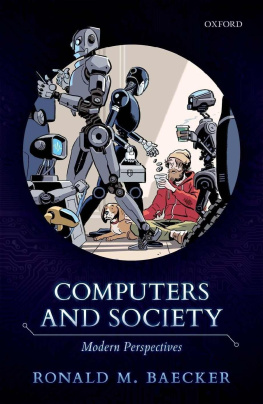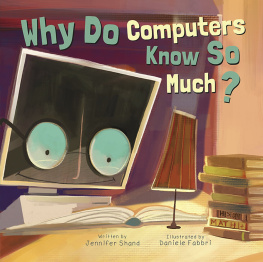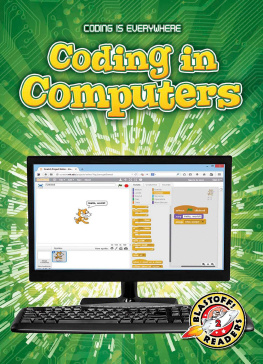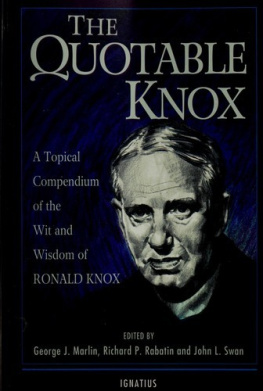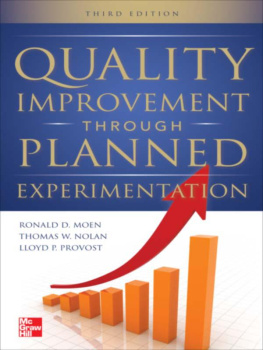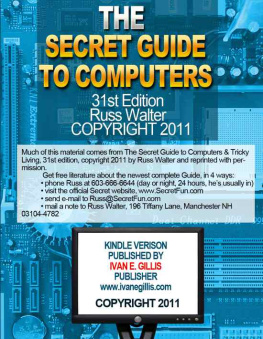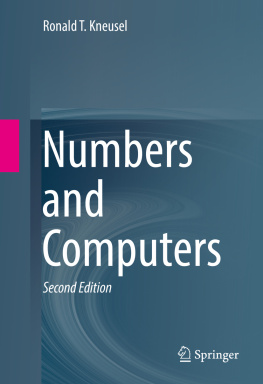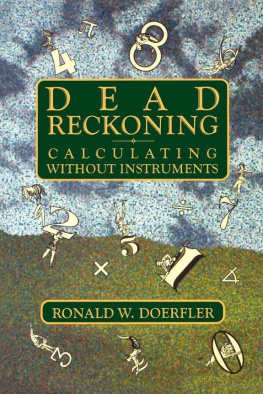Ronald M. Baecker - Computers and Society
Here you can read online Ronald M. Baecker - Computers and Society full text of the book (entire story) in english for free. Download pdf and epub, get meaning, cover and reviews about this ebook. year: 2019, publisher: OUP Oxford, genre: Politics. Description of the work, (preface) as well as reviews are available. Best literature library LitArk.com created for fans of good reading and offers a wide selection of genres:
Romance novel
Science fiction
Adventure
Detective
Science
History
Home and family
Prose
Art
Politics
Computer
Non-fiction
Religion
Business
Children
Humor
Choose a favorite category and find really read worthwhile books. Enjoy immersion in the world of imagination, feel the emotions of the characters or learn something new for yourself, make an fascinating discovery.
- Book:Computers and Society
- Author:
- Publisher:OUP Oxford
- Genre:
- Year:2019
- Rating:4 / 5
- Favourites:Add to favourites
- Your mark:
- 80
- 1
- 2
- 3
- 4
- 5
Computers and Society: summary, description and annotation
We offer to read an annotation, description, summary or preface (depends on what the author of the book "Computers and Society" wrote himself). If you haven't found the necessary information about the book — write in the comments, we will try to find it.
Computers and Society — read online for free the complete book (whole text) full work
Below is the text of the book, divided by pages. System saving the place of the last page read, allows you to conveniently read the book "Computers and Society" online for free, without having to search again every time where you left off. Put a bookmark, and you can go to the page where you finished reading at any time.
Font size:
Interval:
Bookmark:

Ronald M. Baecker


Great Clarendon Street, Oxford, OX2 6DP, United Kingdom
Oxford University Press is a department of the University of Oxford. It furthers the Universitys objective of excellence in research, scholarship, and education by publishing worldwide. Oxford is a registered trade mark of Oxford University Press in the UK and in certain other countries
Ronald M. Baecker 2019
The moral rights of the author have been asserted
First Edition published in 2019
Impression: 1
All rights reserved. No part of this publication may be reproduced, stored in a retrieval system, or transmitted, in any form or by any means, without the prior permission in writing of Oxford University Press, or as expressly permitted by law, by licence or under terms agreed with the appropriate reprographics rights organization. Enquiries concerning reproduction outside the scope of the above should be sent to the Rights Department, Oxford University Press, at the address above
You must not circulate this work in any other form and you must impose this same condition on any acquirer
Published in the United States of America by Oxford University Press
198 Madison Avenue, New York, NY 10016, United States of America
British Library Cataloguing in Publication Data
Data available
Library of Congress Control Number: 2019930247
ISBN 9780198827085 (hbk.)
ISBN 9780198827092 (pbk.)
ebook ISBN 9780192571007
Printed and bound by CPI Group (UK) Ltd, Croydon, CR0 4YY
Links to third party websites are provided by Oxford in good faith and for information only. Oxford disclaims any responsibility for the materials contained in any third party website referenced in this work.
It was the best of times, it was the worst of times, it was the age of wisdom, it was the age of foolishness, it was the epoch of belief, it was the epoch of incredulity, it was the season of Light, it was the season of Darkness, it was the spring of hope, it was the winter of despair...
Charles Dickens, A Tale of Two Cities (1859)
Technological development, be it academic or commercial, often begins with good intentions. Academics and developers envision technology leveraging and advancing both individual and social capabilities in ways that not only make people better but allow people to do things that were previously thought onerous or impossible. Yet technology often becomes a double-edged sword, where bad things accompany the good.
Computers as a technology suffer the same difficulties, but even more so. The swift uptake of diverse computer-based technologies means that change is rapid-fire and unpredictable. We begin to use particular computer technologies because we (or their developers) see the benefits, but rarely do we see the negative consequencesunintended or deliberateuntil it is too late. Indeed, we may not even be fully aware of the issues involved, simply because it is hard to comprehend the full extent of the incremental changes that occur as we live through them.
Computers and Society will help you to understand the changes that are happening now as a consequence of various computer technologies and sensitize you to look for other changes that are likely to happen in the future. While you may be reading it as a required text in a Computers in Society course, the books value goes far beyond that. If you deeply consider the issues presented in each chapter, this book will change how you think about technologys role in society. If you are a developer or product purchaser, it may help you to consider the negative implications of the computer applications you are creating or buyingthat is, to see the dark patterns in how the applications can be misused or subverted, and the various shades of grey in between. If you are a technology consumer, you may better understand and debate the issues that accompany the computer systems you or the people around you are using. If you are just living your day-to-day life, this book may help you to understand and interpret the changes you notice around you, what you hear in the news, and what you talk about with your friends and family.
Computers and Society could not have been easy to write. The breadth, depth, historical context, and relevancy of the topics covered are impressive to say the least, and the amount of work that must have been required to research each topic is somewhat staggering. It needed someone like Ron Baecker to write it. Ron is a senior academic whose career spans the period from the 1960s to 2018 and beyond. As an expert in graphics, humancomputer interaction, and collaboration technologies, he was instrumental in researching and pioneering some of the key computer concepts that we now take for granted. He not only lived through the changes introduced by computers over the last sixty years, but remained highly aware of those changes both through his knowledge of the field and his teaching of various Computers and Society courses over the decades (the first in 1972). I was lucky enough to work with Ron on various academic projects and consider him both a colleague and a friend. He has the personality to fit the authorship of a book such as this. He doesnt accept things at face value. He delves into issues and debates them. He is opinionated, but his opinions are evidence-based. He pioneers, because he is always looking into the future rather than just at the present.
The above quote by Charles Dickens echoes the books sentiment. Computers promise so much to society, but the risks are great. As this book shows, the best and the worst of computers are manifest in many niches of todays society. While you may have a passing awareness of at least a few of the issues raised in this book, Computers and Society will further inform you about those issues through its deep and thoughtful treatment.
Saul Greenberg,
Emeritus Professor, University of Calgary, Canada
Many people helped me to write and publish this book. David Olson, Ishtiaque Ahmed, John DiMarco, Dwight Wainman, and several reviewers made helpful comments on drafts. I am especially grateful to Leslie Mezei, Saul Greenberg, Jonathan Grudin, and Kellogg Booth for extensive and insightful comments and suggestions.
I could not have completed this work in the twenty-two months it took me without the Google search engine, the literature search engine and extensive resources of the University of Toronto Library, and the insightful technology reporting of the New York Times. Sincere thanks to Benjamin Walsh and Michelle Spence at the universitys Engineering Library, who found material for me when I had to admit defeat by the arcane interface of the librarys search engine.
Two undergraduate University of Toronto students contributed to the effort. Mira Rawady ordered books from one of the Frightful Five and found and collected books from the universitys many libraries. Uma Kalkar was extraordinary, proofreading, checking URLs, improving wording, making excellent suggestions, and courageously questioning some of my wording. Because of Uma, I can now make the important assertion that this book was reviewed by one knowledgeable and thoughtful person less than a third of my age.
Several people from Oxford University Press were very helpful. Dan Taber orchestrated a thorough review process of early drafts and believed in the book even when the comments were mixed. Katherine Ward guided image permission clearances. Lydia Shinoj oversaw the books production process. Elizabeth Stone contributed copy editing.
Font size:
Interval:
Bookmark:
Similar books «Computers and Society»
Look at similar books to Computers and Society. We have selected literature similar in name and meaning in the hope of providing readers with more options to find new, interesting, not yet read works.
Discussion, reviews of the book Computers and Society and just readers' own opinions. Leave your comments, write what you think about the work, its meaning or the main characters. Specify what exactly you liked and what you didn't like, and why you think so.

